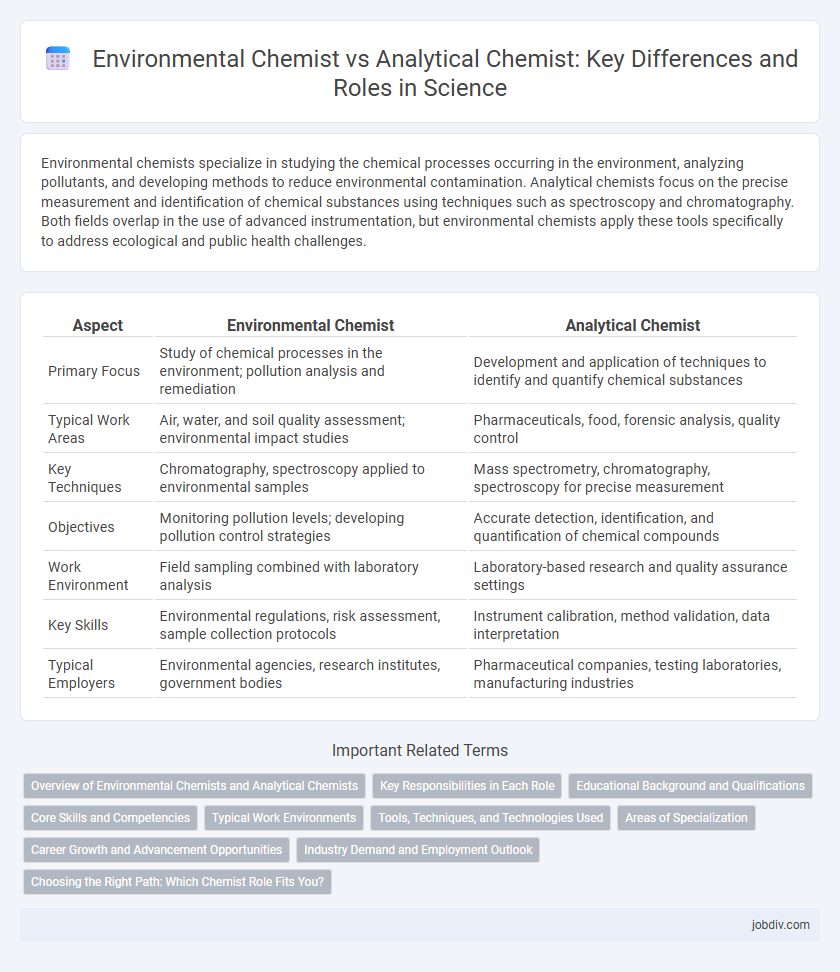Environmental chemists specialize in studying the chemical processes occurring in the environment, analyzing pollutants, and developing methods to reduce environmental contamination. Analytical chemists focus on the precise measurement and identification of chemical substances using techniques such as spectroscopy and chromatography. Both fields overlap in the use of advanced instrumentation, but environmental chemists apply these tools specifically to address ecological and public health challenges.
Table of Comparison
| Aspect | Environmental Chemist | Analytical Chemist |
|---|---|---|
| Primary Focus | Study of chemical processes in the environment; pollution analysis and remediation | Development and application of techniques to identify and quantify chemical substances |
| Typical Work Areas | Air, water, and soil quality assessment; environmental impact studies | Pharmaceuticals, food, forensic analysis, quality control |
| Key Techniques | Chromatography, spectroscopy applied to environmental samples | Mass spectrometry, chromatography, spectroscopy for precise measurement |
| Objectives | Monitoring pollution levels; developing pollution control strategies | Accurate detection, identification, and quantification of chemical compounds |
| Work Environment | Field sampling combined with laboratory analysis | Laboratory-based research and quality assurance settings |
| Key Skills | Environmental regulations, risk assessment, sample collection protocols | Instrument calibration, method validation, data interpretation |
| Typical Employers | Environmental agencies, research institutes, government bodies | Pharmaceutical companies, testing laboratories, manufacturing industries |
Overview of Environmental Chemists and Analytical Chemists
Environmental chemists specialize in studying chemical processes occurring in natural environments, focusing on pollutants' behavior and impact on ecosystems. Analytical chemists develop and apply techniques such as chromatography, spectroscopy, and mass spectrometry to precisely identify and quantify chemical substances in various samples. Both fields integrate chemistry principles, but environmental chemists emphasize ecological consequences while analytical chemists prioritize method development and chemical analysis accuracy.
Key Responsibilities in Each Role
Environmental chemists primarily focus on monitoring and analyzing pollutants in air, water, and soil to assess environmental impact and ensure regulatory compliance. Analytical chemists specialize in developing and applying techniques such as chromatography and spectroscopy to identify chemical compounds and quantify their concentrations in various samples. Both roles require precision in data interpretation, but environmental chemists emphasize ecological and public health implications, while analytical chemists concentrate on method development and quality control across diverse industries.
Educational Background and Qualifications
Environmental chemists typically hold degrees in environmental science, chemistry, or related fields, with specialized courses in toxicology, pollution control, and ecological risk assessment. Analytical chemists often possess degrees in chemistry or chemical engineering, emphasizing techniques such as chromatography, spectroscopy, and instrumental analysis. Both professions generally require advanced qualifications, including master's or doctoral degrees, alongside laboratory experience and proficiency in data interpretation.
Core Skills and Competencies
Environmental chemists specialize in analyzing chemical processes in ecosystems and assessing pollutants, requiring expertise in environmental sampling, toxicology, and regulatory compliance. Analytical chemists focus on developing and applying techniques such as chromatography, spectroscopy, and mass spectrometry to identify and quantify chemical substances with precision and accuracy. Both fields demand strong skills in data interpretation, laboratory instrumentation, and chemical analysis, but environmental chemists emphasize ecological impact and remediation, while analytical chemists prioritize methodological innovation and quality control.
Typical Work Environments
Environmental chemists typically work in field sites, government agencies, research laboratories, and environmental consulting firms, where they analyze pollutants and assess ecological impact. Analytical chemists primarily operate in pharmaceutical labs, manufacturing plants, and quality control laboratories, focusing on the precise measurement and analysis of chemical substances. Both roles require proficiency in instrumentation such as chromatography and spectroscopy, but their work environments differ based on their specialized objectives.
Tools, Techniques, and Technologies Used
Environmental chemists utilize gas chromatography-mass spectrometry (GC-MS) and inductively coupled plasma mass spectrometry (ICP-MS) to analyze pollutants in soil and water samples, focusing on detecting contaminants and assessing environmental impact. Analytical chemists employ high-performance liquid chromatography (HPLC), nuclear magnetic resonance (NMR) spectroscopy, and titration methods to quantify chemical substances with high precision across pharmaceuticals, food, and materials industries. Both fields leverage advancements in spectroscopy, chromatography, and electrochemical sensors, but environmental chemistry emphasizes field-deployable instruments and real-time monitoring technologies for ecological assessments.
Areas of Specialization
Environmental chemists specialize in studying the chemical processes and pollutants affecting air, water, and soil, focusing on environmental monitoring and contamination remediation. Analytical chemists concentrate on developing and applying techniques such as chromatography, spectroscopy, and mass spectrometry to identify and quantify chemical substances in various samples. Both fields utilize advanced instrumentation but diverge in their primary goals, with environmental chemists targeting ecological impact assessments and analytical chemists emphasizing precise substance characterization.
Career Growth and Advancement Opportunities
Environmental chemists often experience career growth through roles in regulatory agencies, environmental consulting firms, and research institutions, where expertise in pollutant analysis and sustainable practices is highly valued. Analytical chemists advance by developing specialized skills in instrumentation, quality control, and method development, frequently moving into leadership positions within pharmaceutical, food safety, and materials science industries. Both fields offer opportunities for interdisciplinary collaboration and innovation, driving professional development through continuous technical skill enhancement and regulatory knowledge.
Industry Demand and Employment Outlook
Environmental chemists are increasingly sought after in industries focused on pollution control, waste management, and sustainable development, driven by stricter environmental regulations and corporate social responsibility initiatives. Analytical chemists maintain strong demand across pharmaceuticals, food safety, and materials manufacturing sectors due to their expertise in precise chemical analysis and quality control. Employment outlook for both fields shows robust growth, with environmental chemists benefiting from green technology expansion and analytical chemists from advancements in instrumentation and regulatory compliance.
Choosing the Right Path: Which Chemist Role Fits You?
Environmental chemists specialize in studying chemical processes in the environment, focusing on pollution analysis, toxicology, and sustainability. Analytical chemists excel in precise measurement techniques, developing methods to identify chemical compositions in various substances across industries. Choosing between these roles depends on your interest in environmental impact and regulatory compliance versus method development and instrumentation expertise.
Environmental Chemist vs Analytical Chemist Infographic

 jobdiv.com
jobdiv.com